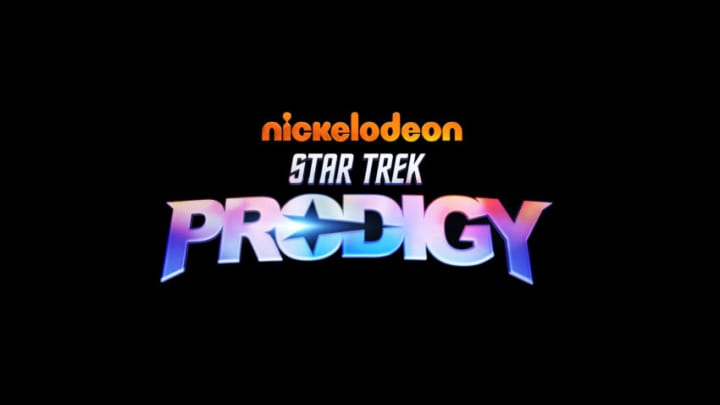Star Trek Prodigy serves up its first away mission and first cliffhanger.
In last week’s episode of Star Trek Prodigy, Dal told Rok, Zero, and Jankom if something sounds too good to be true, it is. The events of “Dream Catcher” teach all our characters that truth the hard way.
Although Dal needs some prodding from Hologram Janeway, the Protostar lands on a class M planet in the Hirogen system to investigate it. Despite Janeway’s admonition that the “cadets” look after one another on this, their first away mission, Dal takes off for a joyride in the Runaway (the Protostar’s ground vehicle), leaving Rok, Zero, and Jankom to explore on their own.
Soon, all four characters are trapped in weed-like cilia that comes up from the planet’s surface, taking on the appearance of whatever they want most. Dal, for instance, sees the backs of the parents he never knew. He realizes the illusion for what it is when “Hologram Janeway” appears to him, even though the real Hologram Janeway cannot leave the Protostar.
Zero realizes the planet is a “superorganism,” “luring and consuming its prey for nutrients.” Fighting their way free from the increasingly aggressive cilia, Dal and Zero liberate Rok and Jankom from the false realities in which they’ve been trapped.
Meanwhile, Gwyn has telepathically summoned the shapeshifting blade Rok confiscated from her, again escaped from the brig, and used her education in starship operations to seize control of the Protostar, and Hologram Janeway with it.
Gwyn attempts to leave the planet, but its cilia wrap themselves around and penetrate the ship. Abandoning ship in the shuttle with Murf, Gwyn arrives on the surface as the others watch as the Protostar apparently crashes to the ground beyond the horizon. They are stranded.
“Dreamcatcher” takes Star Trek Prodigy viewers to complex emotional places
Dangerous alien spores and planets that make one’s secret thoughts manifest are venerable Star Trek tropes. But these tried and true plot devices feel fresh in “Dreamcatcher” because they affect young protagonists.
Seeing these youths’ most fervent desires laid bare is, in three of the five cases, quite poignant. Zero’s fascination with the Protostar’s engine seems merely a reminder of that particular mystery box. Jankom’s indulgence in the non-existent stew plays mainly for laughs, although his reference to a “Tellar sleeper ship” must hint at his backstory.
Rok, Dal, and Gwyn all experience, with various degrees of intensity, the pain of an unrequited desire for love—though not romantic love.
Rok wants friends who like her, with whom she can lose herself in playful laughter. The critters she sees are pretty darn cute, but they are illusions, and Trek has insisted since “The Cage” that illusions cannot truly love.
Dal wants to know his parents—he “yearns” for them, says faux Hologram Janeway. He only sees the backs of the figures the planet’s cilia form. Dal never knew his parents’ faces. The face-to-face connection children have with their parents is critical to their healthy development and their wholeness. Some thinkers, such as the late theologian James Loder, even see in an infant’s engagement with a parental face traces of “the power of the Holy One, the Face that will not go away.” I don’t think “Dreamcatcher” sets out to make any religious points, but the lack of those loving faces in Dal’s life has left him wounded. It’s a pain the planet all too readily exploits.
Gwyn knows her father’s face, but she doesn’t recognize it in the face the planet presents to her when masquerading as Solum the Diviner. It shows Gwyn a healthy face, a face full of joy in beholding her, and a face whose mouth calls her by her full name and express pride in her. The planetary organism reads the relationship Gwyn wants with Solum, but only provokes Gwyn into realizing, “You are not my father.”
This moment packs the episode’s biggest emotional punch, and gives us our clearest insight yet into Gwyn. She doesn’t simply want to see the stars, as we learned in the pilot episode. She wants to see herself as “Gwyndala,” beloved of her father. When she takes control of the Protostar, she does so out of a deep emotional pain. She knows her father truly cares about the ship. She is not as sure he truly cares about her.
Four episodes in, and Star Trek Prodigy is already taking us to rich and complex emotional territory—all in the space of 23-minute episodes full of fast-paced action, stunning animation (the Protostar’s landing on the planet rivals any similar sequence we’ve seen in live action Trek), and humor. (Yes, I even found the fart joke amusing!)
I can’t wait for next week—not only to see what happens next, but also to see how Prodigy continues to make us care about its characters. Kudos to this children’s show for continuing the Star Trek tradition of inviting viewers to wrestle with the emotional issues we must all face in order to grow into our best possible selves.
